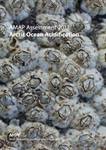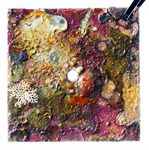

Sea Change: Food for Millions at Risk
A remote Indonesian village highlights the threats facing millions of people who depend on marine creatures susceptible to souring seas and ocean warming.


A remote Indonesian village highlights the threats facing millions of people who depend on marine creatures susceptible to souring seas and ocean warming.


The report by the Arctic Monitoring and Assessment Program on Arctic Ocean Acidification was recently released and identifies the risks to Arctic ecosystems, including indigenous tribes and Arctic residents.


An environmental crisis is looming on the marine horizon. Ocean acidification threatens Maine’s inshore fisheries, growing aquaculture industry and the jobs that rely on them.
The culprit in this story is carbon dioxide. It’s changing the chemistry of the ocean and endangering shellfish like lobster, oysters, clams and sea urchins.


Ocean acidification due to excessive release of carbon dioxide into the atmosphere is threatening to produce large-scale changes to the marine ecosystem affecting all levels of the food chain, a University of B.C. marine biologist warned Friday.
Chris Harley, associate professor in the department of zoology, warned that ocean acidification also carries serious financial


NORMANBY ISLAND, Papua New Guinea — Katharina Fabricius plunged from a dive boat into the Pacific Ocean of tomorrow.
She kicked through blue water until she spotted a ceramic tile attached to the bottom of a reef.
A year earlier, the ecologist from the Australian Institute of Marine Science had placed this small


California and Oregon are joining forces to help address ocean acidification and hypoxia, a West Coast-wide thereat to our shared marine and coastal ecosystem. The California Natural Resources Agency , on behalf of the California Ocean Protection Council (OPC), today signed a Memorandum of Understanding with the state of Oregon to jointly sponsor a high-level
The NOAA Ocean Acidification Program (OAP) works to prepare society to adapt to the consequences of ocean acidification and conserve marine ecosystems as acidification occurs. Learn more about the human connections and adaptation strategies from these efforts.
Adaptation approaches fostered by the OAP include:


Using models and research to understand the sensitivity of organisms and ecosystems to ocean acidification to make predictions about the future, allowing communities and industries to prepare


Using these models and predictions as tools to facilitate management strategies that will protect marine resources and communities from future changes


Developing innovative tools to help monitor ocean acidification and mitigate changing ocean chemistry locally
Drive fuel-efficient vehicles or choose public transportation. Choose your bike or walk! Don't sit idle for more than 30 seconds. Keep your tires properly inflated.
Eat local- this helps cut down on production and transport! Reduce your meat and dairy. Compost to avoid food waste ending up in the landfill
Make energy-efficient choices for your appliances and lighting. Heat and cool efficiently! Change your air filters and program your thermostat, seal and insulate your home, and support clean energy sources
Reduce your use of fertilizers, Improve sewage treatment and run off, and Protect and restore coastal habitats
You've taken the first step to learn more about ocean acidification - why not spread this knowledge to your community?
Every community has their unique culture, economy and ecology and what’s at stake from ocean acidification may be different depending on where you live. As a community member, you can take a larger role in educating the public about ocean acidification. Creating awareness is the first step to taking action. As communities gain traction, neighboring regions that share marine resources can build larger coalitions to address ocean acidification. Here are some ideas to get started: